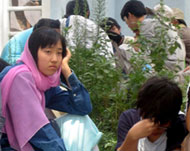Afghanistan deports evangelicals
About 400 evangelical Christians from South Korea were flown out of Afghanistan’s capital Kabul on Friday following orders to leave after their presence caused security fears in the Islamic country.

The Afghan government put on special flights to take them from Kabul to the northern city of Mazar-i-Sharif and western Herat from where they would leave the country by land – the same way they entered, a South Korean official said.
“We flew some 400 people either to Mazar or Herat … we have some left because some of the planes were too small,” he said on condition of anonymity. The remainder of 600 due to depart on Friday would likely leave on Saturday.
Hundreds more were expected to follow, including some who had flown in from Almaty, Dubai and New Delhi and would be sent back the way they came.
The government ordered them out amid fears for their safety, with some Muslim clerics already complaining that they were preaching Christianity – which is illegal in this conservative country where religion is highly sensitive.
Despite repeated warnings from the South Korean government, the group began arriving in war-torn Afghanistan over the past few days for what they said was a trip to get to know the country and help with its reconstruction.
‘Peace festival’
 |
|
The group insisted that the S Koreans |
The visit, labelled “Rejoice! Afghanistan!” was to have culminated in a now-cancelled “peace festival” in Kabul at the weekend to have showcased sporting and cultural events.
The event was being organised by the South Korean-based Institute of Asian Culture and Development (IACD), a humanitarian non-government organisation linked to evangelical Christians.
The group insisted the South Koreans were not here to preach.
About 1,500 South Koreans, including 600 children and some with US and Canadian citizenship, had entered on tourist visas, an organiser said.
About 700 were in the capital and the rest were in other major centres including Herat, Mazar-i-Sharif and Bamiyan in the centre.
Those from Bamiyan were among the group being flown to Mazar and Herat on Friday to join the exodus home.
Afghan authorities had ordered the group to leave because “they said they had some assessment and the risk of them becoming a target is very high,” the South Korean official said.
Fears of attack
|
“they said they had some assessment and the risk of them becoming a target is very high” a South Korean official said |
A group of clerics in Mazar-i-Sharif has spoken out against the visitors, accusing them of trying to spread Christianity – which they deny – and said the government should deport them.
And a South Korean foreign ministry official said in Seoul on Thursday that a South Korean Red Cross vest planted with explosives was found on July 24 in a village near Kabul, heightening fears of an attack.
The government has not announced that it has asked the South Koreans to leave, but one high-ranking official said they had appeared to be “misusing their tourist visas”, which would be grounds for them to be thrown out.
South Korean Christians are noted for aggressive evangelism, notably in communist China and Islamic nations.
Western embassies have been watching the situation with concern, mindful of dramatic protests that have flared in the past – some of them targeted at foreigners.
The conversion of an Afghan to Christianity caused weeks of debate around March over whether he should be executed under Islamic Sharia law. The controversy died down when the convert, Abdul Rahman, was spirited away to Italy amid fears for his life.
Weeks earlier, European cartoons of the Prophet Mohammad had sparked nationwide protests directed at foreign troops and groups that left 17 demonstrators dead.